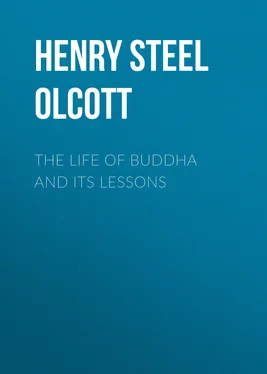Henry Steel Olcott - The Life of Buddha and Its Lessons
Здесь есть возможность читать онлайн «Henry Steel Olcott - The Life of Buddha and Its Lessons» — ознакомительный отрывок электронной книги совершенно бесплатно, а после прочтения отрывка купить полную версию. В некоторых случаях можно слушать аудио, скачать через торрент в формате fb2 и присутствует краткое содержание. Жанр: foreign_prose, foreign_religion, Философия, foreign_psychology, foreign_antique, на английском языке. Описание произведения, (предисловие) а так же отзывы посетителей доступны на портале библиотеки ЛибКат.
- Название:The Life of Buddha and Its Lessons
- Автор:
- Жанр:
- Год:неизвестен
- ISBN:нет данных
- Рейтинг книги:5 / 5. Голосов: 1
-
Избранное:Добавить в избранное
- Отзывы:
-
Ваша оценка:
- 100
- 1
- 2
- 3
- 4
- 5
The Life of Buddha and Its Lessons: краткое содержание, описание и аннотация
Предлагаем к чтению аннотацию, описание, краткое содержание или предисловие (зависит от того, что написал сам автор книги «The Life of Buddha and Its Lessons»). Если вы не нашли необходимую информацию о книге — напишите в комментариях, мы постараемся отыскать её.
The Life of Buddha and Its Lessons — читать онлайн ознакомительный отрывок
Ниже представлен текст книги, разбитый по страницам. Система сохранения места последней прочитанной страницы, позволяет с удобством читать онлайн бесплатно книгу «The Life of Buddha and Its Lessons», без необходимости каждый раз заново искать на чём Вы остановились. Поставьте закладку, и сможете в любой момент перейти на страницу, на которой закончили чтение.
Интервал:
Закладка:
Henry Steel Olcott
The Life of Buddha and Its Lessons
The thoughtful student, in scanning the religious history of the race, has one fact continually forced upon his notice, viz ., that there is an invariable tendency to deify whomsoever shows himself superior to the weakness of our common humanity. Look where we will, we find the saint-like man exalted into a divine personage and worshipped for a god. Though perhaps misunderstood, reviled and even persecuted while living, the apotheosis is almost sure to come after death: and the victim of yesterday's mob, raised to the state of an Intercessor in Heaven, is besought with prayer and tears, and placatory penances, to mediate with God for the pardon of human sin. This is a mean and vile trait of human nature, the proof of ignorance, selfishness, brutal cowardice, and a superstitious materialism. It shows the base instinct to put down and destroy whatever or whoever makes men feel their own imperfections; with the alternative of ignoring and denying these very imperfections by turning into gods men who have merely spiritualised their natures, so that it may be supposed that they were heavenly incarnations and not mortal like other men.
This process of euhemerisation, as it is called, or the making of men into gods and gods into men, sometimes, though more rarely, begins during the life of the hero, but usually after death. The true history of his life is gradually amplified and decorated with fanciful incidents, to fit it to the new character which has been posthumously given him. Omens and portents are now made to attend his earthly avaṭāra: his precocity is described as superhuman: as a babe or lisping child he silences the wisest logicians by his divine knowledge: miracles he produces as other boys do soap-bubbles: the terrible energies of nature are his playthings: the gods, angels, and demons are his habitual attendants: the sun, moon, and all the starry host wheel around his cradle in joyful measures, and the earth thrills with joy at having borne such a prodigy: and at his last hour of mortal life the whole universe shakes with conflicting emotions.
Why need I use the few moments at my disposal to marshal before you the various personages of whom these fables have been written? Let it suffice to recall the interesting fact to your notice, and invite you to compare the respective biographies of the Brāhmaṇical Kṛṣhṇa, the Persian Zoroaster, the Egyptian Hermes, the Indian Gauṭama, and the canonical, especially the apocryphal, Jesus. Taking Kṛṣhṇa or Zoroaster, as you please, as the most ancient, and coming down the chronological line of descent, you will find them all made after the same pattern. The real personage is all covered up and concealed under the embroidered veils of the romancer and the enthusiastic historiographer. What is surprising to me is that this tendency to exaggeration and hyperbole is not more commonly allowed for by those who in our days attempt to discuss and compare religions. We are constantly and painfully reminded that the prejudice of inimical critics, on the one hand, and the furious bigotry of devotees, on the other, blind men to fact and probability, and lead to gross injustice. Let me take as an example the mythical biographies of Jesus. At the time when the Council of Nicea was convened for settling the quarrels of certain bishops, and for the purpose of examining into the canonicity of the three hundred more or less apocryphal gospels that were being read in the Christian churches as inspired writings, the history of the life of Christ had reached the height of absurd myth. We may see some specimens in the extant books of the apocryphal New Testament, but most of them are now lost. What have been retained in the present Canon may doubtless be regarded as the least objectionable. And yet we must not hastily adopt even this conclusion, for you know that Sabina, Bishop of Heracha, himself speaking of the Council of Nicea, affirms that "except Constantine and Sabinus, Bishop of Pamphilus, these bishops were a set of illiterate, simple creatures that understood nothing"; which is as though he had said they were a pack of fools. And Pappus, in his Synodicon to that Council of Nicea, lets us into the secret that the Canon was not decided by a careful comparison of several gospels before them, but by a lottery . Having, he tells us, "promiscuously put all the books that were referred to the Council for determination under a Communion table in a church, they (the bishops) besought the Lord that the inspired writings might get up on the table, while the spurious writings remained underneath, and it happened accordingly ".
But letting all this pass and looking only to what is contained in the present Canon, we see the same tendency to compel all nature to attest the divinity of the writer's hero. At the nativity a star leaves its orbit and leads the Persian astrologers to the divine child, and angels come and converse with shepherds, and a whole train of like celestial phenomena occurs at various stages of his earthly career, which closes amid earthquakes, a pall of darkness over the whole scene, a supernatural war of the elements, the opening of graves and the walking about of their tenants, and other appalling wonders. Now, if the candid Buḍḍhist concedes that the real history of Gauṭama is embellished by like absurd exaggerations, and if we can find their duplicates in the biographies of Zoroaster, Shaṅkarāchārya and other real personages of antiquity, have we not the right to conclude that the true history of the Founder of Christianity, if at this late date it were possible to write it, would be very different from the narratives that pass current? We must not forget that Jerusalem was at that time a Roman dependency, just as Ceylon is now a British, and that the silence of contemporary Roman historians about any such violent disturbances of the equilibrium of nature is deeply significant.
Конец ознакомительного фрагмента.
Текст предоставлен ООО «ЛитРес».
Прочитайте эту книгу целиком, на ЛитРес.
Безопасно оплатить книгу можно банковской картой Visa, MasterCard, Maestro, со счета мобильного телефона, с платежного терминала, в салоне МТС или Связной, через PayPal, WebMoney, Яндекс.Деньги, QIWI Кошелек, бонусными картами или другим удобным Вам способом.
Интервал:
Закладка:
Похожие книги на «The Life of Buddha and Its Lessons»
Представляем Вашему вниманию похожие книги на «The Life of Buddha and Its Lessons» списком для выбора. Мы отобрали схожую по названию и смыслу литературу в надежде предоставить читателям больше вариантов отыскать новые, интересные, ещё непрочитанные произведения.
Обсуждение, отзывы о книге «The Life of Buddha and Its Lessons» и просто собственные мнения читателей. Оставьте ваши комментарии, напишите, что Вы думаете о произведении, его смысле или главных героях. Укажите что конкретно понравилось, а что нет, и почему Вы так считаете.






![Brian Thompson - A Monkey Among Crocodiles - The Life, Loves and Lawsuits of Mrs Georgina Weldon – a disastrous Victorian [Text only]](/books/704922/brian-thompson-a-monkey-among-crocodiles-the-life-thumb.webp)





